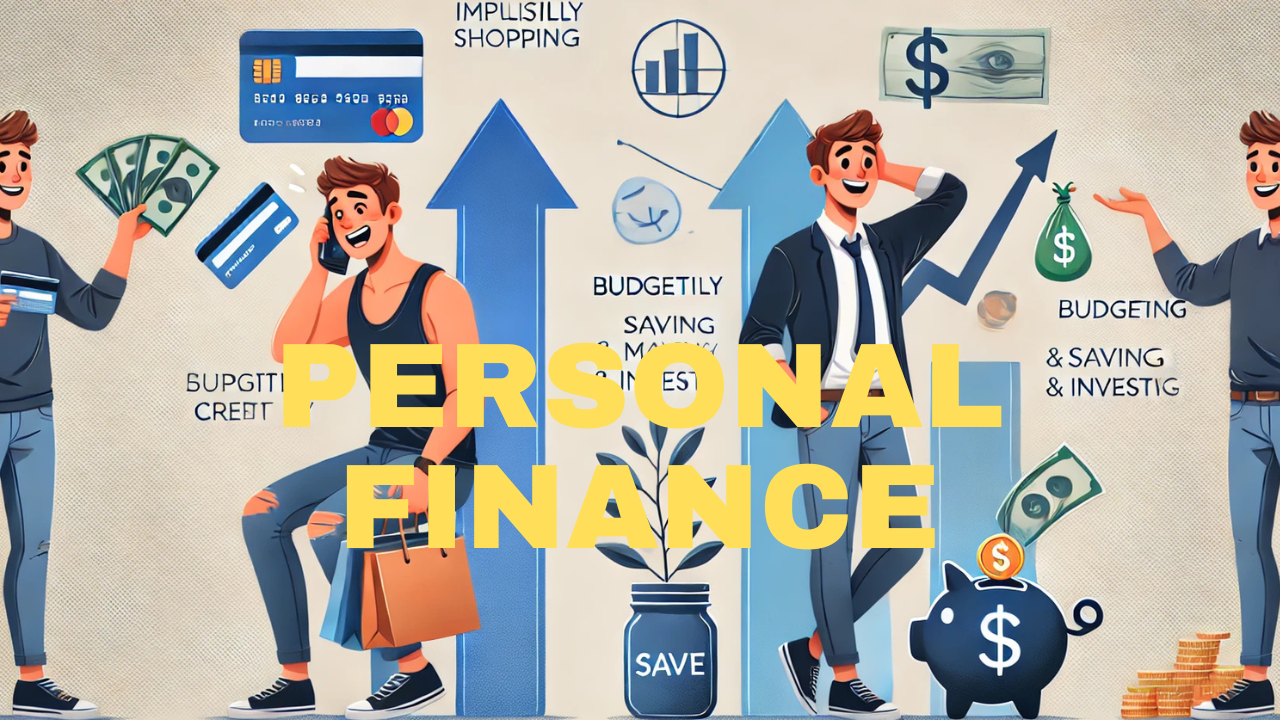Personal finance is not just about numbers—it’s about your habits, emotions, and decision-making process. No matter how much you earn, if your financial behavior is poor, you may struggle with money. On the other hand, disciplined financial habits can help you build wealth over time.
Understanding the Role of Behavior in Personal Finance
Many people believe that managing money is all about income, expenses, and investments. While these are important, the real driver behind financial success is your behavior.
How Behavior Affects Financial Decisions And Managing Personal Finance
| Financial Behavior | Impact on Personal Finance |
|---|---|
| Spending impulsively | Leads to debt and financial stress |
| Consistently saving | Helps build financial security |
| Investing wisely | Grows wealth over time |
| Budgeting effectively | Prevents overspending and improves savings |
| Ignoring financial planning | Leads to financial instability |
A person earning $100,000 a year but spending $110,000 will be in debt, while someone earning $50,000 but saving 20% of their income will be financially secure.
This shows that income alone doesn’t determine financial health—behavior does!
Key Behavioral Patterns That Affect Personal Finance
A. Impulse Spending vs. Conscious Spending
- Impulse buyers often spend emotionally, leading to credit card debt and financial stress.
- Conscious spenders plan their purchases, prioritize needs over wants, and build wealth.
🔹 Example: Instead of buying the latest iPhone on credit, a conscious spender might wait for discounts or buy a previous model and invest the saved money.
B. Instant Gratification vs. Delayed Gratification
- Instant gratification makes people spend now and worry later.
- Delayed gratification helps in building wealth through patience and discipline.
🔹 Example: Investing $200 monthly instead of spending on luxury items can grow into millions over time due to compound interest.
C. Fear-Based Financial Decisions
Many people avoid investing due to fear of loss, but this behavior prevents them from growing wealth.
Solution: Learn about diversification, risk management, and long-term investing to build confidence.
Psychological Biases That Affect Money Management
Our mindset and psychology influence financial behavior. Here are some common biases that lead to poor financial decisions:
| Bias | Impact on Finances | Solution |
|---|---|---|
| Lifestyle Inflation | Spending more as income rises | Stick to a budget and increase savings |
| Anchoring Bias | Relying on old price points | Compare real market values before purchasing |
| Overconfidence Bias | Thinking you’re better at investing than you are | Diversify investments and seek financial advice |
| Loss Aversion | Fear of losing money stops people from investing | Invest with a long-term perspective |
| Herd Mentality | Following trends without research | Make informed financial choices |
🔹 Example: If a stock price drops, loss-averse investors panic and sell, while rational investors buy more at lower prices.
How to Improve Your Financial Behavior
To develop healthy money habits, and develop pro level Personal Finance follow these strategies:
A. Build Financial Discipline
- Follow the 50/30/20 rule (50% needs, 30% wants, 20% savings).
- Use automatic transfers to savings and investment accounts.
- Track your expenses using apps like Mint, YNAB, or Personal Capital.
B. Shift Your Money Mindset
- Focus on wealth-building rather than spending.
- Change your view from “I can’t afford this” to “How can I afford this?”
C. Create a Personalized Financial Plan
- Set SMART financial goals (Specific, Measurable, Achievable, Relevant, Time-bound).
- Build an emergency fund to avoid financial stress.
- Invest consistently in stocks, mutual funds, and retirement accounts.
🔹 Example: Investing $500 monthly in an S&P 500 index fund can turn into $1 million+ in 30 years!
D. Avoid Financial Pitfalls
- Avoid lifestyle inflation as your income increases.
- Reduce debt by paying off high-interest loans first.
- Always negotiate bills and compare financial products.
The Power of Small Changes in Financial Behavior
Many people believe that big income jumps are necessary to build wealth. However, small changes in financial habits have a significant impact.
Small Money Habits That Lead to Wealth
Habit vs. Impact on Wealth
| Habit | Yearly Savings | 10-Year Growth (@7% Return) |
|---|---|---|
| Cutting $5 daily coffee | $1,825 | $25,307 |
| Cooking at home 3x a week | $1,500 | $20,799 |
| Negotiating bills | $1,200 | $16,639 |
| Investing in an index fund | $5,000 | $69,265 |
🔹 Example: Investing the money saved from cutting small expenses can grow into hundreds of thousands of dollars over time.
The Science Behind Financial Behavior:
Why We Spend the Way We Do
Our financial choices are heavily influenced by psychology and behavioral economics. The way we think, feel, and react to money plays a huge role in how we earn, save, and invest.
A. The Emotional Side of Money
Many financial decisions are emotion-driven rather than logic-driven. People often:
- Spend impulsively when they feel stressed, happy, or anxious.
- Fear investing due to past financial losses.
- Feel guilt or regret after overspending.
🔹 Example: Some people go on shopping sprees when feeling sad or stressed, leading to credit card debt.
Solution: Recognizing emotions tied to spending can help break negative financial patterns. Practicing mindful spending can prevent unnecessary purchases.
B. The Power of Habit in Financial Success
Most people follow financial habits developed over years. These habits are hard to break, but small changes can create a positive impact.
🔹 Example: If you grew up in a household where money was always tight, you might have a scarcity mindset, leading to fear of spending or investing.
Solution: Shift to an abundance mindset—believe that money is a tool to grow wealth, and practice wise spending and investing habits.
The Role of Financial Literacy in Shaping Behavior
One of the biggest reasons people make poor financial decisions is lack of financial education. Schools don’t teach personal finance, leaving many adults struggling with:
- Credit card debt
- No savings or emergency fund
- Poor investment decisions
- Living paycheck to paycheck
How Financial Literacy Influences Behavior for Personal Finance
| Level of Financial Literacy | Behavior & Impact |
|---|---|
| High Financial Literacy | Saves regularly, invests wisely, and avoids unnecessary debt. |
| Moderate Financial Literacy | Knows the importance of saving but struggles with budgeting. |
| Low Financial Literacy | Lives paycheck to paycheck, has high debt, and avoids investing. |
🔹 Example: Studies show that people who understand compound interest are more likely to start investing early, leading to higher wealth accumulation.
Solution: Take time to educate yourself on budgeting, saving, investing, and financial planning
Overcoming Common Financial Mistakes Caused by Behavior
Many people face financial struggles due to poor money habits. Here’s how to overcome them:
A. Living Beyond Your Means
Problem: Spending more than you earn leads to debt and financial stress.
Solution:
- Follow the 50/30/20 budgeting rule.
- Use a zero-based budget where every dollar is assigned.
- Cut unnecessary subscriptions and impulse purchases.
🔹 Example: Instead of spending $400 per month on dining out, limit it to $150 and save $250 for investments.
B. Not Having an Emergency Fund
Problem: Many people don’t save for unexpected expenses, leading to financial crisis during medical emergencies, job loss, or car repairs.
Solution:
- Save 3-6 months of expenses in a high-yield savings account.
- Automate monthly contributions to your emergency fund.
🔹 Example: If your monthly expenses are $3,000, aim to save $9,000 – $18,000 as a safety net.
C. Relying Too Much on Credit Cards
Problem: Credit cards encourage overspending and high-interest debt.
Solution:
- Use credit cards only for planned expenses and pay the balance in full.
- Switch to cash or debit cards for everyday purchases.
🔹 Example: If you have $5,000 in credit card debt at 20% interest, you will pay over $1,000 in interest per year. Paying it off quickly saves money!
The Long-Term Benefits of Good Financial Behavior
Making smart financial decisions today can lead to long-term financial freedom and developing good Personal Finance.
A. Financial Stability
- ️ Less debt and more savings lead to less financial stress.
- ️ Having an emergency fund ensures peace of mind.
B. Wealth Accumulation
- ️ Consistently investing in stocks, real estate, and retirement accounts leads to wealth growth.
🔹 Example: Investing $500 per month in an index fund averaging 8% returns can grow to over $1.5 million in 40 years.
C. Early Retirement & Financial Freedom
- ️ Following good money habits allows you to retire early and live comfortably.
- The FIRE Movement (Financial Independence, Retire Early) encourages people to save 50-70% of their income for early retirement.
Action Plan: How to Improve Your Financial Behavior Today
Step 1: Identify Your Money Habits
- ️ Track your spending for 30 days to see where money goes.
- Identify bad habits (e.g., impulse spending, credit card overuse).
Step 2: Set Clear Financial Goals
- ️ Define short-term, mid-term, and long-term goals.
- Example:
- Short-term: Save $1,000 for emergencies in 6 months.
- Mid-term: Pay off $5,000 credit card debt in 12 months.
- Long-term: Invest $500/month for retirement.
Step 3: Automate & Budget
- ️ Automate savings and investments.
- ️ Use budgeting tools like YNAB, Mint, or Excel.
Step 4: Educate Yourself
- ️ Read 1 personal finance book per month.
- ️ Follow finance podcasts and blogs.
Step 5: Stay Consistent
- ️ Review your progress every 3 months.
- ️ Adjust goals as needed.
Final Thoughts: Your Financial Future Depends on Your Behavior
- ️ Personal finance is 80% behavior and 20% knowledge.
- ️ Your habits, mindset, and decisions determine financial success.
- ️ Start with small changes today to build long-term wealth.
Your financial success is in your hands! It’s not about how much you earn, but how you manage and grow your money.
🔹 Want to improve your money habits and build wealth?
👉 Subscribe to Money Teaches for expert financial tips!
📩 Stay Updated! Join our newsletter for weekly insights on saving, investing, and financial freedom.
Subscribe to our newsletter!



